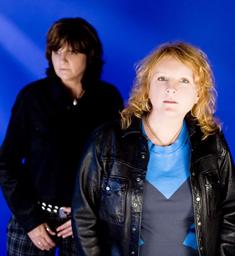Their image might be as fashionable as socks and sandals, but the Indigo Girls’ Amy Ray and Emily Saliers don’t care.
In fact, the lesbian folk-rock duo has made a career ignoring the naysayers and bulldozing the barriers of convention. How else could they have survived more than 20 years in the music industry, navigating a male-dominated, heterosexual hierarchy?
Ray admits it hasn’t been easy. The Indigo Girls released their first major label album in 1988 and earned a Grammy Award in 1990. They continued to generate Billboard-charting albums, building a large fan base even before joining the women-only Lilith Fair festival, which may have marked the height of their popularity.
“I feel like women are still stuck in that cycle where for a while it’s really trendy to have more strong women and more women played on the radio, and then there’ll be a backlash against it,” Ray says.
She and Saliers agree that rock music is the biggest hurdle for women in music.
“Rock is still really male and really white,” Ray says. “Folk music, that’s where women are either kind of trendy or they’re not.
“When we started, we were coming on the heels of our mentors who had to struggle to have a word in the studio,” she continues. “The producer would run things and take the instruments out of the women’s hands and put them in some studio guy’s hands, and that was the story we were told by our older friends in the corporate major label world. Then Heart came along, and other groups, that made it obvious that women can do it themselves.”
But the Indigo Girls weren’t just women being self-sufficient. They were also lesbians, publicly out in virtually untested waters.
“It was scary to be gay — we didn’t want that to be our identifier at first,” Ray admits. “We had mentors who were women artists and had seen them be so pigeonholed and were so bitter about it. You know, ‘Don’t just play to a gay audience, it will be your doom.’ After our second CD, I started talking more about it in the press, and Emily was coming around to talking about it. We definitely came out through a time when fear was a big part of it.”
Being openly gay allowed the Indigo Girls to mine a built-in audience, but it’s proven to be a double-edged sword. For better or for worse, their music has been described as “political lesbian folk music.”
“We might sing to an audience of political lesbians, and we might be political lesbians, but I don’t know if you can categorize our music that way,” Rays says. “I understand why people use that. I think we’re still in a queer movement in music where we’re trying to be part of an infrastructure where the gatekeepers are still straight white men. But I don’t really pay attention to it anymore. In my opinion, it’s not really a way to define music…. It’s like when they say, ‘That guy plays white hip hop.’ You know they don’t mean anything good,” Ray laughs.
“I can see why we’re labelled as such,” Saliers says. “There’s not a lot of open-mindedness. Once you’re gay, you’re gay and you’re pegged. My first fear was that we would be pigeonholed and we were, but that’s just short-mindedness. It’s just life. Not all of our songs have political content, and they’re not all about lesbian reality, though that’s the lens with which we view life, obviously. Can’t get around that.”
It’s also impossible to ignore the fact that plenty of other rock and pop acts have surpassed the Indigo Girls in popularity. Lady Gaga (Ray is a huge fan), Katy Perry and a host of others have recently claimed the spotlight, but neither Saliers or Ray is concerned about fading into obscurity just yet.
“The proof is in young people experiencing our music in a positive way. If you can speak to young people, then I think your music is still relevant. We’ve been around so long that our first generation of fans all have kids now, practically, so we get their kids, thank God,” Saliers laughs.
“Amy and I write songs about what’s happening in the world, and we’re deeply troubled by war and injustice and inspired by nature, and that subject matter will always be relevant. It’s a human concern; it doesn’t matter if you’re a lesbian, an artist or a postal worker.”
The recently remounted Lilith Fair will likely broaden the Indigo Girls’ audience, and the timing couldn’t be better. They’ve recently given the middle finger to conventional record labels, successfully going independent again and reclaiming their roots with their most recent album, Poseidon and the Bitter Bug. Their last independent release was 25 years ago.
“It’s so liberating,” Saliers says. “There’s nothing a label can do for us that we can’t do on our own. We have the same management and the same agent, and we’ve had the same touring people for a long time, so we can do it ourselves. There’s nothing a label does for us except get in our way, slow down the process of getting stuff out and take a chunk of our money.”
“We’re older, we’ve been around for a long time, we’re queer, we’re political, all those things that record labels don’t know how to deal with,” Ray adds. “It’s funny. It’s like they were better about it in the late ‘80s, early ‘90s, dealing with that strident artist personality that’s doing something against the grain.
“Major labels are for people who can be part of the mainstream and that’s fine, but we don’t fit in there,” Ray says. “It feels good to be doing what we want. That’s how we started and it’s always been where my heart’s at.”

 Why you can trust Xtra
Why you can trust Xtra


